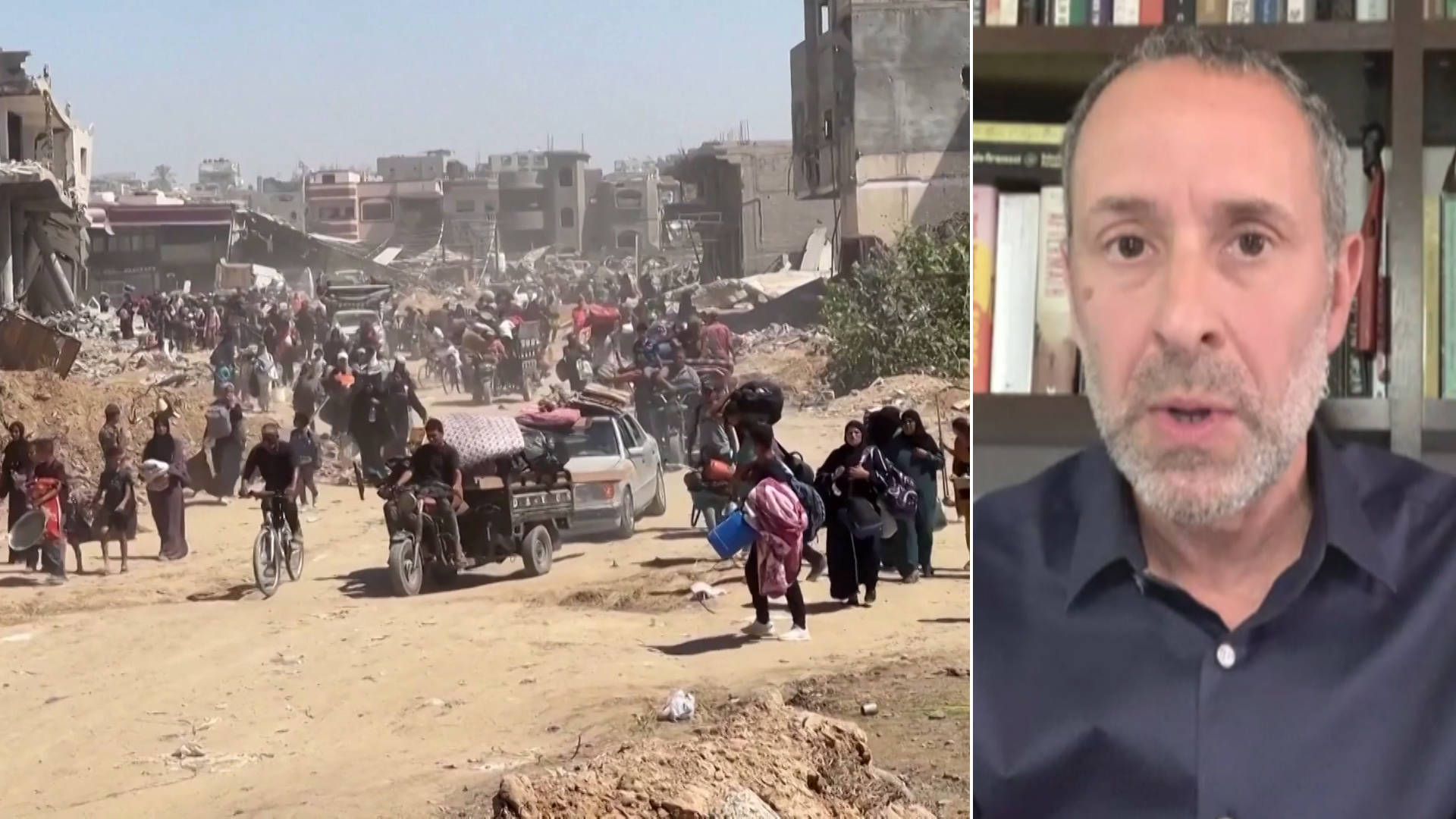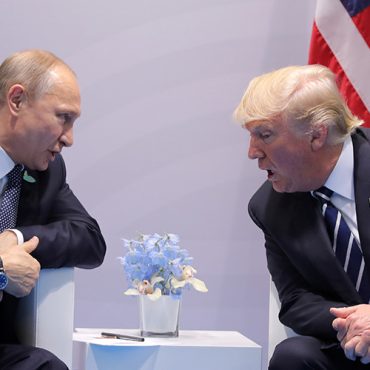This is a rush transcript. Copy may not be in its final form.
AMY GOODMAN: This is Democracy Now!, democracynow.org, The War and Peace Report. I’m Amy Goodman, with Juan González.
French President Emmanuel Macron, German Chancellor Olaf Scholz and British Prime Minister Keir Starmer issued a joint statement Monday endorsing the latest push by mediators in Qatar, Egypt and the United States to broker a ceasefire agreement for Israel’s war on Gaza. The three countries have urged Israel and Hamas to meet for negotiations Thursday, August 15th, in either Cairo or Doha to finalize a deal.
However, Hamas has called on the U.S., Qatar and Egypt to implement the ceasefire proposal put forward by President Joe Biden in May instead of holding more rounds of negotiations and discussing new proposals for Gaza. The May 6th proposal was agreed to by Hamas at the time and rejected by Israel. In a statement Sunday, Hamas said, quote, “The mediators should enforce this [May 6 proposal] on the [Israel] instead of pursuing further rounds of negotiations or new proposals that would provide cover for the occupation’s aggression and grant it more time to continue its genocide against our people,” unquote.
On Monday, State Department deputy spokesperson Vedant Patel was asked about the ceasefire talks.
HUMEYRA PAMUK: Are the ceasefire talks that you called for August 15 — are they still going to go ahead after what Hamas said last night?
VEDANT PATEL: So, I’m aware of those comments from Hamas, and we fully expect talks to move forward, as they should. All negotiators should return to the table and bring this deal to conclusion. … We believe that there has been headway made, but we need to finalize this agreement, continue to close and bridge some gaps. But we believe that an agreement is possible, and that’s something that we’re going to continue to work between the parties.
AMY GOODMAN: Meanwhile, the Israeli assault on Gaza continues, with 32 Palestinians killed in the past 24 hours, according to the Gaza Health Ministry. The spokesperson for Hamas’s armed wing, the Al-Qassam Brigades, said Monday one Israeli hostage was killed and two other women captives seriously wounded in two separate incidents in Gaza. The United Nations Security Council is meeting today to discuss the war on Gaza in the wake of this weekend’s devastating Israeli airstrike on a school and a mosque within it in Gaza City that killed over 100 Palestinians.
Daniel Levy joins us, president of the U.S./Middle East Project, former Israeli peace negotiator under Israeli Prime Ministers Ehud Barak and Yitzhak Rabin.
Daniel Levy, welcome back to Democracy Now! OK, Qatar, U.S. and Egypt calling for sit-down negotiations on Thursday, August 15th, Hamas saying they want to stick with Biden’s proposal from May, can you talk about how far apart these sides are and the significance of the chief Hamas negotiator, Ismail Haniyeh, having been assassinated in Tehran on the day that the new Iranian president was inaugurated, what that means for these talks?
DANIEL LEVY: Absolutely. Look, it’s very hard to make the case, if you are an objective observer of this, that the Israeli party is interested in a ceasefire, in even getting its own hostages back, when it assassinates the political leader of the movement that it is in negotiations with at a very high-profile, sensitive location and moment. And therefore, what you read, day in, day out, in much of the Israeli press, Amy, what you hear from many named and unnamed Israeli security officials, not just those of us on the outside saying, “OK, let me put the jigsaw puzzle together,” it’s quite clear Netanyahu does not want a ceasefire deal.
And therefore, the question with regard to how far apart are the parties, there is a paper, there are terms, but what is the intention, the goal of the respective parties? And Hamas has been — one has to just acknowledge this, cut through all the attempts to say, “Well, it can only ever be Hamas that’s responsible for no deal.” If you cut through all of that, there has been a consistent position that a deal could be made if this is an on-ramp to a permanent ceasefire, to Israel withdrawing from Gaza, Palestinians being able to go back to the areas where they previously lived — many destroyed, most destroyed — versus a position of the Israeli leadership which says, “We can have a pause. We can get some hostages back” — by the way, there are very significantly less numbers of Israelis being held in Gaza still alive today than there were when these talks began. So, the Israeli position is, “We can do some of that, but the moment this first phase ends, we will continue this relentless war on Gaza and all the human costs and catastrophes that have come with it.” That’s the Netanyahu position.
So, that then translates into a couple of things. One is, in the negotiation positions themselves, Netanyahu will put in all kinds of additional demands, which he knows will derail the talks. And then, what do the mediating parties do? And here, there is, of course — this isn’t a team of equals when it comes to the mediators. There is a primus inter pares. That is the United States. That is the party who, as we just heard from Professor Makdisi, without the arms being sent to Israel, this could not continue. What does the U.S. do? Is it willing to, so to speak, lay the dead cat at the door of the party responsible, namely Prime Minister Netanyahu, or will it continue to run cover for Netanyahu? For months and months, it has been the latter. And now we see ourselves still in a regional conflagration dynamic.
And I would — finally, just to note this. I think the talks planned for this week, there is a hope that maybe this theory that the Israeli parliament, the Knesset, is in recess — if you’re going to get Israelis out, you’re running out of time. There’s perhaps a hope that maybe Netanyahu, despite everything, will go for a deal. But I think most of what this is about is trying to avoid the regional escalation by saying, “Hey, there are these talks. We can get that ceasefire.” As we just heard, if you get a ceasefire in Gaza, you can deescalate the region. So I think this is mostly an exercise in trying to create and sow some confusion, and offer a ladder, perhaps, to Iran, Hezbollah, the Axis of Resistance, not to go there. And it’s much less, sadly, about actually bringing an end to the horrific realities in Gaza.
And I insist that — let’s just pause for a minute. What the people of Gaza are going through, the number of dead, the number of injured, the humanitarian conditions, the permanent displacement. You’re sent from one place to another with no safety. This appalling word laundering of “safe zones,” which are no such thing, constantly attacked by Israel, schools, U.N. compounds. We hear from Palestinians and medical workers in Gaza that people have learned to identify what does a naval artillery sound like versus a drone versus a fighter aircraft about to drop, more often than not, American bombs on you. This is appalling. And it shouldn’t. Let’s be very clear: Israel being held to account for violations of international law, and the insistence that Israel adhere to international law, and American or any other weapons not be used in the committing of crimes, war crimes, plausible genocide, this should not depend on ceasefire talks. This should end, full stop, because it is illegal.
JUAN GONZÁLEZ: And, Daniel Levy, I wanted to ask you about the credibility of the United States before the world community, given the fact that President Biden more than three months ago said the outlines of a deal had already been agreed to by the parties, and here we are, and there still is no agreement.
DANIEL LEVY: I find it hard to put the words “credibility in the international community” and “United States” in one sentence, after all of this. And I think much of the international community, if one can use that term, does so, as well.
What we are seeing right now is that Washington has only one playbook. And it is a failed playbook. It is a distorted playbook. And that consists of the following. Rather than restraining, reining in, pressuring, using the massive leverage you have on Israel so that Israel will desist from committing crimes, whether those are the mass crimes in Gaza or the extrajudicial provocative assassinations that threaten escalation, rather than using your influence to prevent Israeli crimes, you try and use deterrence, you try and use threats, to prevent Iran and others from responding to those Israeli crimes.
Now, that does a few things. First of all, it means that by standing with Israel as it commits these crimes, you are complicit in the criminality in Gaza and in the continuation of that by enabling it. Secondly, I do think that there is something of an ideological alignment. And we just have to be clear: America is playing the role as a member of the axis of Zionist extremism. And I think the U.S. wants Israel — having seen the shift in the balance of power go against Israel, it wants Israel to reassert deterrence and to be able to drive escalation dominance.
But then you asked a third question, and that’s where I think you were going, Juan, which is to say: How does this serve America’s interests? Surely, there’s a divergence of interest here. And I would say that there is. There is not an American interest in a regional conflagration, but because you’re unwilling to restrain Israel, and all you are willing to do is to threaten the other side more, it means that you deploy more military assets. It means that you put America at the risk of being dragged into a war. That also means that your international reputation, when you’re running cover for an apartheid regime, in violation of ICJ rulings, with an ICC request for an arrest warrant against its leaders — it means that your reputation, as you suggest, is not only sullied, but it is being dragged through the mud on a daily basis. You can’t claim to stand up for values, for international law, to be taking a principled position, in Russia, Ukraine or anywhere else, when you are in this position of support for Israeli violations.
And it also brings you to a place, politically, where if you’re a Democrat administration, why are you letting this guy make the weather? There’s a piece by the former head of the MI6 — I’m here in London — John Sawers in the FT. And what he wrote just a few days ago was that he thinks Netanyahu wants to pull America into a regional war and wants to undermine the Kamala Harris candidacy and strengthen the prospects of Trump.
And this is a trap that the Biden administration has made for itself, let’s be very clear. They are responsible for not drawing a line, for not reining Israel in and for continuing to send the weapons. And it is not good enough, it is embarrassing and humiliating, that what they occasionally do is they leak to Axios or some favored media out there, “Hey, Biden got really angry. He was really frustrated with Netanyahu on their phone call.” Do me a favor. You’re grown-ups. Be serious. You send the weapons. This is not America using its leverage. This is America basically lining up, and trying to bring others in the region into alignment, with an axis of Zionist extremism. And it will not deliver security for Israelis, either, not in the short term and not in the long term.
AMY GOODMAN: Daniel Levy, we want to thank you for being with us, president of U.S./Middle East Project, former Israeli peace negotiator under Israeli Prime Ministers Ehud Barak and Yitzhak Rabin.
Coming up, Washington escalates its efforts against Venezuelan President Maduro following July’s contested election. We’ll host a debate. Stay with us.
[break]
AMY GOODMAN: “There’s a New World Coming” by Bernice Johnson Reagon. She died last month.











Post comments (0)